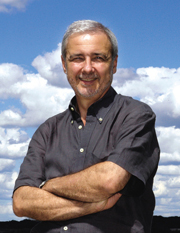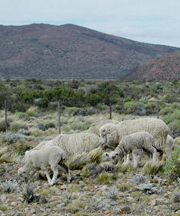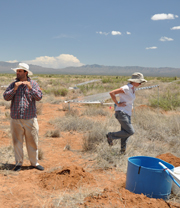January 27, 2011
Q&A with Osvaldo Sala

Dr. Osvaldo Sala

Sustainable management of grazing in arid Patagonian ecosystems requires assessing the different services that they provide including food, fiber, carbon storage, and conservation of biodiversity.

Graduate students work in a large-scale field experiment in the Chihuahuan Desert, NM, where they manipulate rainfall to simulate the major effects of climate change in arid ecosystems.
Osvaldo Sala is a Distinguished Sustainability Scientist in the Global Institute of Sustainability and Julie A. Wrigley Chair and Foundation Professor in the School of Sustainability and in the School of Life Sciences. He is recognized as an international leader in ecological and global environmental science through his work as past president of the Scientific Committee on Problems of the Environment and as coordinating lead author of the Millennium Ecosystem Assessment. The latter was a five-year research effort by more than 1000 of the world’s leading scientists to assess the state of the world’s ecosystems and the services they provide.
At what point did sustainability become part of your research focus?
In my early academic career as an agronomist in Argentina, I saw direct evidence of overgrazing in Patagonia and depletion of soil fertility in the Pampas. This convinced me that current practices were not sustainable and that we needed to make radical changes in natural resource management.
What are your most important sustainability-related research projects?
I am working on a regional-scale project to assess the sensitivity of North American ecosystems to climate change. Sensitivity is one of two main factors determining the impacts of climate change on an ecosystem – the other factor being the rate of warming. Yet while relatively much is known about the rate of warming, little is currently known about ecosystem sensitivity. Our research thus far reveals large differences between ecosystems in terms of their actual response per unit of warming.
I am also developing scenarios for global biodiversity change over the next 50 and 100 years that will simplify our understanding of these complex systems. As a part of this work, I am analyzing how a broad range of socio-economic conditions, such as degree of globalization, might affect biodiversity in different regions of the world.
How do you think your research will affect decision-making?
By uncovering how different ecosystems respond to climate change, we can significantly improve our ability to predict the impacts it will produce in different regions. This will help us predict change and develop mitigation actions tailored to each region.
What is the world sustainability challenge that concerns you most?
Climate change is our most important sustainability challenge. The scope of the problem and its intricate relationships with development and economic growth will leave no one untouched.
January 27, 2011

